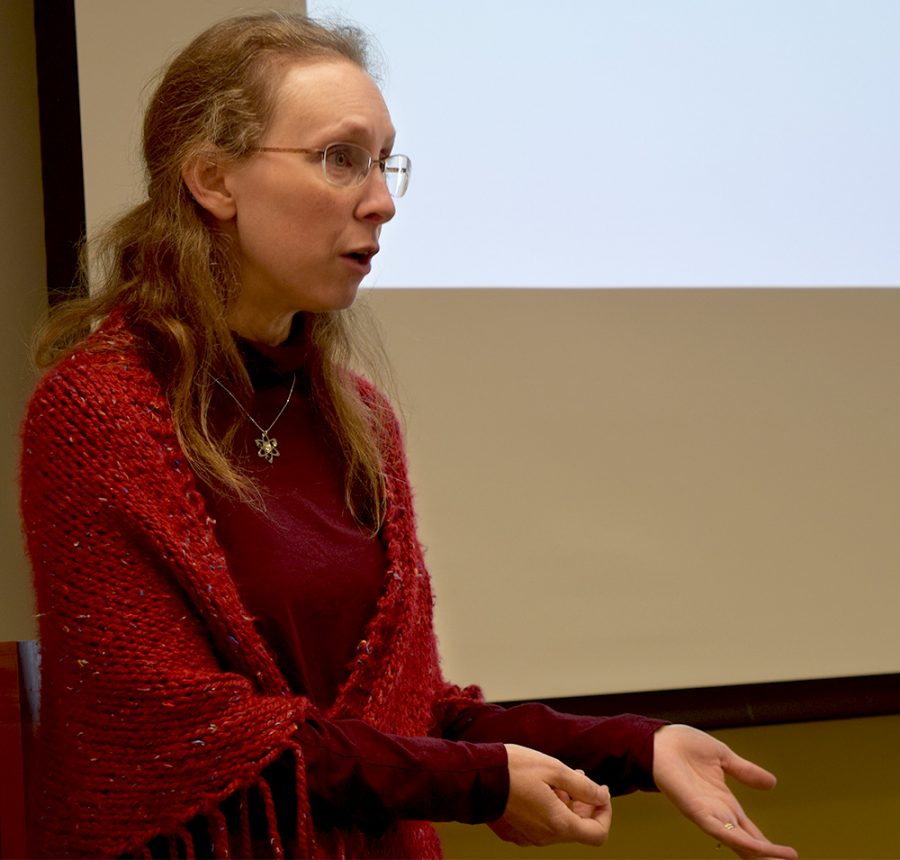CAA begins program review, updates minor, creates D2L page
Rebecca Peebles, physical chemistry department chair, presents a review of the chemistry department during the past eight years. With 41-44 majors, the chemistry department has seen a lot of growth throughout these past years. Peebles said it is projected to keep growing.
October 26, 2017
The Council on Academic Affairs began the process of reviewing academic programs on campus and started with the Chemistry program during its meeting Thursday.
Rebecca Peebles, physical chemistry department chair, discussed the recent eight-year review of the Chemistry BS that occurred last year.
She said that some programs and areas of research have been delayed due to a massive vandalism in 2011 that destroyed lots of necessary equipment, but the program is doing well and is continuing to grow.
“In the last seven years, degrees in STEM fields have been growing immensely, and so we are seeing the reflection of that in the demand for chemistry and biochemistry,” Peebles said.
Peebles said one of the reasons for this growth might have to do with the current shift away from foreign scientists and toward American ones.
Last year, the department changed biochemistry from a concentration to a BS, and Peebles said that has helped improve department growth.
“We’re already seeing a huge increase in interest in biochemistry in our department because students can go on the list of majors on the webpage and they see it there,” Peebles said.
Some appeals of Eastern’s chemistry and biochemistry programs are the amount of research undergraduates do.
Right now, 100 percent of undergraduates have completed some type of research, she said.
The courses for undergraduates focus a lot on the qualitative and quantitative reasoning aspects of experiments and thinking, with upper level courses expanding on those two factors.
The goal, Peebles said, is to help students think on their own both in everyday aspects and in the classroom or lab setting.
“We really try to get students to think about what they’re doing, and that is across the curriculum,” Peebles said. “(The chemistry and biochemistry programs are) a serious application of reasoning and learning some background material and applying it to other problems.”
Another unique aspect of the chemistry and biochemistry programs, Peebles said, is the fact that students have to do a seminar junior and senior year, not just the one that other schools require.
This allows students to learn from their first seminar and improve upon the second one, Peebles said.
Many teachers in chemistry and biochemistry are on a rotation schedule, which keeps the classes “fresh,” said Peebles.
The kinesiology and sports study minor was updated, with two courses, KSS 3700 and KSS 3550, which are no longer being offered, now being consolidated to one current course, KSS 3720.
Although KSS 3720 has been used as a replacement course for some time, the CAA voted to update the minor so it now reflects this.
It was also voted to make Health Administration Option, which used to be a concentration under Health Promotions, its own BS in order to attract more students.
Both proposals were unanimously approved.
The CAA also voted to suspend their bylaws, which said that a voting member of CAA could not keep minutes or record votes, until a permanent replacement of the past secretary can be found.
Misty Rhoades, associate professor of health promotion, offered to take up secretarial duties for the rest of the semester while Marita Gronnvoll, associate chair of communication studies, offered to pick up the duties for the spring semester.
The CAA also created a D2L page to post future agendas, minutes and as a way for faculty to submit proposals.
The group will no longer use the CAA website, but it will be kept as an archive tool.
Brooke Schwartz can be reached at 581-2812 or bsschwartz@eiu.edu.





































































